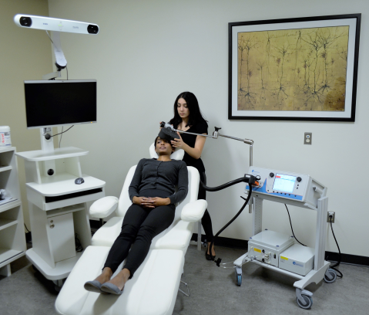Non-invasive brain stimulation shows promise in reducing psychological distress in advanced illness
 Repetitive transcranial magnetic stimulation (rTMS) involves safely delivering repeated electromagnetic pulses to the brain through a hand-held device or helmet. Photo republished with permission from CMAJ.A small clinical trial at The Ottawa Hospital and Bruyère has shown for the first time that repetitive transcranial magnetic stimulation (rTMS) holds promise as a treatment for psychological distress in people with advanced illness.
Repetitive transcranial magnetic stimulation (rTMS) involves safely delivering repeated electromagnetic pulses to the brain through a hand-held device or helmet. Photo republished with permission from CMAJ.A small clinical trial at The Ottawa Hospital and Bruyère has shown for the first time that repetitive transcranial magnetic stimulation (rTMS) holds promise as a treatment for psychological distress in people with advanced illness.
Over the last decade, rTMS has become a standard therapy for people with treatment-resistant depression, but this is the first trial to test the therapy in the palliative care setting. The five-day therapy involves safely delivering repeated electromagnetic pulses to the brain through a hand-held device or helmet.
As reported in Palliative Medicine, five of the six trial participants had a 50 per cent or greater improvement in depression, anxiety or both within two weeks.
“While these results are promising, we will need larger, randomized controlled trials to know for sure if this therapy is effective and safe,” said lead author Dr. James Downar, palliative and critical care physician and associate scientist at The Ottawa Hospital and Bruyère. “We are already planning our next trial,” added Dr. Downar, who also leads the Division of Palliative Care at the University of Ottawa.
Dr. Downar and other members of the research team have a relationship with a company that is advancing rTMS.
Authors: Downar J, Lapenskie J, Anderson K, Edwards J, Watt C, Dionne M, Rice J, Kabir M, Lawlor P, Downar J.
Funding: Canadian Cancer Society, Lotte and John Hecht Memorial Foundation
The Ottawa Hospital is a leading academic health, research and learning hospital proudly affiliated with the University of Ottawa and supported by The Ottawa Hospital Foundation. All researchers at The Ottawa Hospital follow a Responsible Innovation framework for developing and commercializing innovations in a responsible way.
Learn more about:
The Ottawa Hospital is a leading academic health, research and learning hospital proudly affiliated with the University of Ottawa and supported by The Ottawa Hospital Foundation.


